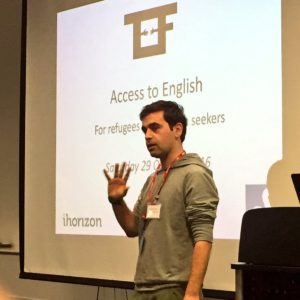Cambridge English and Techfugees hosted a conference on how technology can help refugees learn English.
Investors, technology experts and education specialists came together to work on language learning solutions that will make a difference to the lives of refugees and asylum seekers.
Juliet Wilson from Cambridge English opened by highlighting the enthusiasm in the language teaching profession for wanting to help. She said: ‘As an industry we have a great bank of skills and support to offer. We’re seeing lots of great initiatives but there is much more we can do through voluntary teaching, free resources and other language learning programmes. Technology will obviously play a huge role in helping migrants and refugees to learn English. At Cambridge English we are creating more and more digital content. Lots of this is free and it can reach vastly more people if we can work out how to get it there’.
Gillian Ragsdale spoke of her experiences teaching in Calais and the recent demolition of the ‘Jungle’. Fiona Pape (British Council) and Tony Capstick (University of Reading), delivered a discussion on the recent report, ‘Language for Resilience’, and facilitated a Skype call with former refugees now living in the Kurdistan region of Iraq.
 Ahmad Al- Rashid, a Syrian refugee currently studying for an MSc in Violence, Conflict and Development at the University of London, spoke about his experiences of fleeing Aleppo, studying English online, and winning scholarships at four universities.
Ahmad Al- Rashid, a Syrian refugee currently studying for an MSc in Violence, Conflict and Development at the University of London, spoke about his experiences of fleeing Aleppo, studying English online, and winning scholarships at four universities.
His story embodied the resilience and determination of so many Syrian people who have fled their country. Ahmad offered valuable insights into the language learning needs of refugees and asylum seekers.
Afternoon workshops, each with their own specific challenges, involved all guests in problem solving that was geared towards presenting a ‘lightning pitch’ at the end of the day.
Challenges included innovative approaches to teacher training, offline digital content, and establishing vital learner needs. Guests were offered the opportunity to pledge their time, resources, contacts or investment to the projects that they deemed most viable.